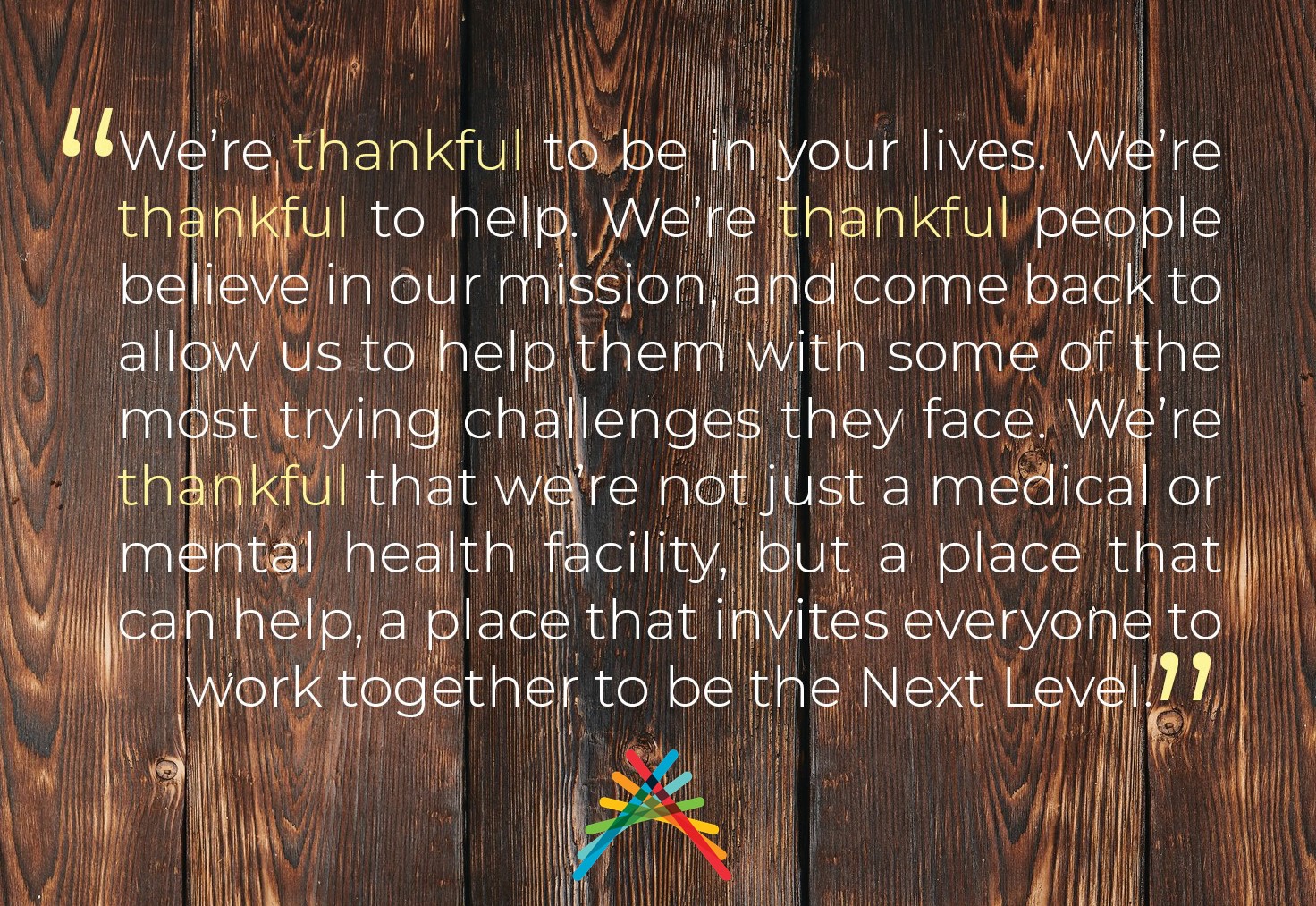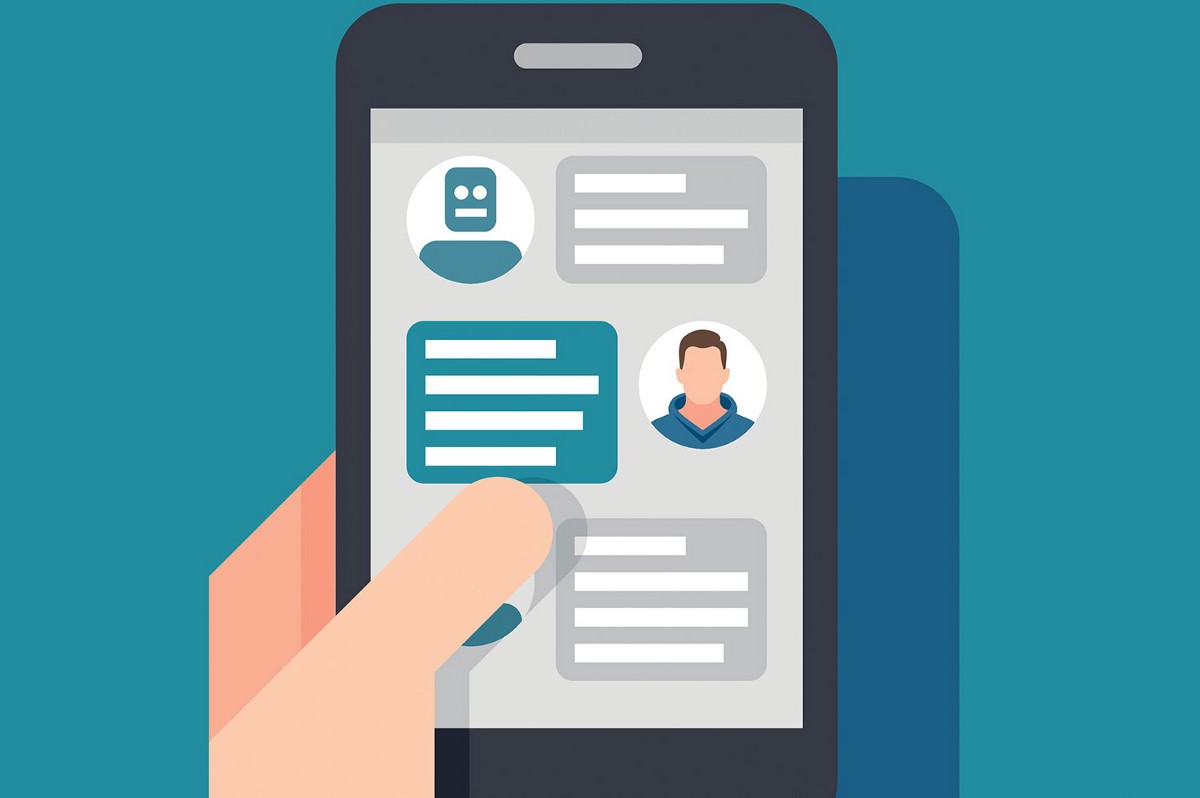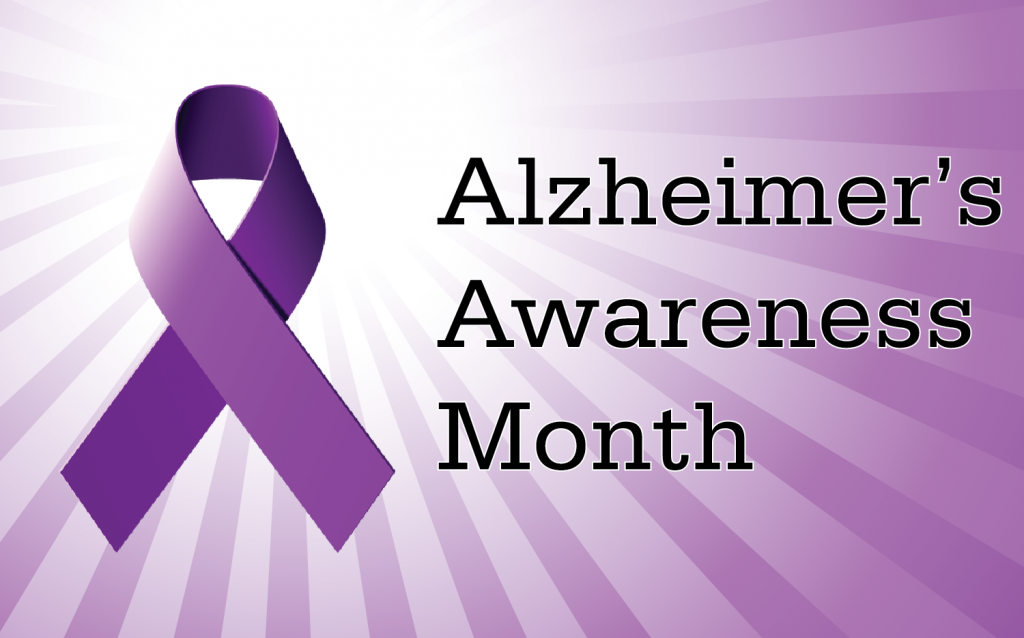What We’re Thankful for This Year
Meet the Chatbots
A Culture of Giving
Alzheimer’s Awareness Month
What We’re Thankful for This Year

Tomorrow is Thanksgiving. It came later this year than it normally does, but at least it’s finally here, and we couldn’t be more excited. Soon friends and families will be reuniting, having dinner together, and giving thanks for the best things in their lives. Alivation Health is no different. We wanted to take this time to say what we’re thankful for, what has had the most meaning for us in 2019, and what we hope to be thankful for in 2020 and beyond.
We’ve been around a long time. Premier Psychiatric, our former company name, was founded in 1998. We rebranded almost two years ago to what we are now. 20+ years is an excellent run for any company, and we’re thankful—beyond thankful—for the longevity. We’re thankful for the ability to keep serving patients, keep expanding our services, keep trying new technologies, keep doing better and doing all that we can.
Mostly, we’re thankful for the patients.
Everything we do, and all the great things we have achieved, are both for and by patients. We see hundreds of them a day, many thousands a year. We’re thankful that for all these years, and in whatever name incarnation we are in, they trust us to do a great job. They trust Dr. Duffy and have for many years. They trust our staff, our providers, our nurses, our care coordinators. We can only help if there is mutual trust. We’re thankful for that trust, as it is crucial to doing a great job.
We’re thankful that we have been able to invest in new treatment and assessment technologies, and new, dynamic employees to use those technologies. We’re thankful for the opportunity to advance the understanding of brain and behavioral health, and to help more people than we previously could. Every day we reach someone new who needs us is a great day. Every person we see is an opportunity to positively impact someone’s life, challenge ourselves, work harder, and build and grow while helping. We’re proud of Aesthetics, our new branded affiliate, and believe 2020 will bring great things for it.
We’re thankful that our patients and staff have helped us live up to the Next Level You motto. We’re thankful that they trust and believe in us to partner in their care. We’re thankful people are willing to do all that is necessary to reach that Next Level, and their hope and commitment inspires us daily to do all the things we promise to do. We’re thankful they help us uphold our core values. Without those values, we wouldn’t be what we are today. We wouldn’t have the discipline, humility, drive, passion, and openness that it takes to do truly extraordinary things in this field. We’re thankful we stand out from the rest.
We’re going to keep growing. We’ve added many new people to our team this year, and we’re thankful for all of them. They love working here, and we’re thankful we’ve spent the time and effort to build the kind of company people want to work at. Our company culture didn’t happen overnight, and we’re very grateful for all the staff that work to make this company inclusive, efficient, warm and essential. This time next year, I’m sure we’ll be thankful for even more great new people who’ve joined our ranks.
We’re thankful to be in your lives. We’re thankful to help. We’re thankful people believe in our mission, and come back to allow us to help them with some of the most trying challenges they face. We’re thankful that we’re not just a medical or mental health facility, but a place that can help, a place that invites everyone to work together to be the Next Level. We’ll never stop being thankful for it, even if we mainly acknowledge these things around Thanksgiving. We’ll never stop doing all the things we do, because they’re the right things to do.
Thank you to everyone who has helped make it all possible.
Meet the Chatbots

An old saying in mental health care is that, very often, people simply need someone to talk to. Chatting with someone about what stresses and bothers you can help you work things out for yourself, or alleviate tension and anxiety in your mind. Even verbalizing your feelings can have a clarity effect. It doesn’t necessarily matter with whom you talk—what matters most is what you get from the experience itself.
Enter chatbots.
Four of the most famous are Woebot, Wysa, Joyable, and Talkspace. They range in price and style, but the basic idea is the same: you chat. These apps and bots are mostly AI-driven, so there isn’t someone on the other side listening and responding, except in Talkspace, which matches you with a therapist or counselor. Woebot, for instance, uses cognitive behavioral therapy (CBT) technique to communicate with its humans. They ask questions, ask about your day, how you’re feeling, and later might get into heavier things, such as what makes you afraid, why are you stressed, and what is bothering you.
Using deep learning and analyzing your text usage and emojis, for instance, chatbots can discern mood and feelings, and according to reviews, they do this function rather well. One of the drawbacks, of course, is that in these early stages the chatbots can sound a little scripted, or not always respond to nuanced questions with nuanced answers. But this is improving every day, and as you talk with it more, it becomes more and more attuned to your style. In a few years, the chatbot might even know more about you than your friends do. As privacy is a concern in the modern world, Wysa, for example, uses private and encrypted chats.
Some of the chatbots also offer quizzes and videos to help stimulate your mind, or to help ease your anxiety by taking your mind off things. Their biggest benefit is in providing a stimulating and safe output that lets you speak your mind without fear of reprisal or judgment, and to relax and just get things off your mind. There are a whole host of apps being developed for smart devices and mental health now, but chatbots are some of the simplest in their goals and designs.
While chatbots are very cool and have lots of benefits, there are a few drawbacks and disclaimers about them as well. First and foremost, they are never a substitute for a licensed, trained therapist. Chatbots are a fun and possibly beneficial addition to a mental health improvement program, but they should never be the entire thing. They aren’t a substitute for prescribed medication, or regular contact with friends and family, or self-improvement exercises and overall goals. The key to using them effectively is balance, and to set realistic expectations for what they can and cannot do. Chatbots are a form of technology and don’t necessarily understand concerns that are deeply human, and they rely on programming and data mining whereas humans might rely on intuition or feelings. There can be a disconnect here for users.
But they’re getting better all the time, and at the end of the day, they’re simply a fun tool to help make you feel better. They provide a nice outlet for many people, and they do it in a safe, low-cost way that shouldn’t disrupt your life. As the real goal is to talk through your challenges, this outlet seems to have great potential. The act of talking and opening up is an important step in a mental health program, and we’re happy its being socially encouraged in any way it can be, human or not.
A Culture of Giving

As we enter the holiday season, its important to think about others.
This is the time of year when we tend to focus on giving to those less fortunate, or those in great need of services and intervention. At Alivation, this idea is never far from our mind. One of our team members organizes a charity coat donation drive every year to benefit the local homeless population, and we donate presents to CEDARS (https://cedarskids.org/). Giving people in the community a happy (and warm) holiday season is a wonderful tradition around here.
For those looking for good charities and local businesses doing good to support, there are many. One close to our mission is called the Brain Injury Alliance of Nebraska (https://biane.org/), which does exceptional work on the part of those with TBIs. They raise awareness, foster education, reduce the stigma, and put people in touch with mental and physical health practitioners to help everyone who struggles with a brain injury. From student athletes to the elderly, this is a terrific cause and highly needed in today’s world.
The Foundation for Lincoln Public Schools (https://www.foundationforlps.org/) is another. Their mission is to help all local youth, be it through their student homeless fund, their family literacy initiatives, or their activities assistance fund. Mental health challenges can start early in life, and they’re often exacerbated by social and economic issues. By helping children as early as possible, the Foundation for Lincoln Public Schools is doing an amazing service that will help children with their overall health and well-being for their entire lives.
The Pediatric Cancer Action Network (https://www.pcanaction.org/) works hard to reduce the financial burden undertaken by families with an ill child. There is nothing harder for a family than to go through this kind of challenge, and the assistance and support network this charity offers cannot be overstated. At a time when families need it most, they are there to assist and be a champion for an essential cause.
We’re very lucky to live in such a close, caring community like Lincoln. We have no shortage of charities and charitable organizations, ranging from food banks, mental health awareness, parks and recreation, family centers, disease prevention and treatment, to book and coat donations. We don’t have room to list them all here—a great problem to have! A more comprehensive list of options can be found at: https://greatnonprofits.org/city/lincoln/NE. We highly encourage everyone to look through this list, and sign up, donate, or volunteer on behalf of any of these outstanding charities. There is something here for all of us to care about, no matter what it is. All donations help, big or small. Sharing the message on social media increases awareness and education.
With this culture of giving, we have an exciting opportunity to improve thousands of lives throughout the entire state. This time of year helps remind us what we can do to make the world a better place, and what we can do to alleviate pain and hardship for those who need it the most. Our winters are cold, but with the right warmth we can make a genuine difference.
Alzheimer’s Awareness Month

November is Alzheimer’s Awareness Month.
Alzheimer’s is ranked as the sixth leading cause of death in the United States, although new estimates suggest the disease may rank just behind heart disease and cancer as a cause of death for older people. Alzheimer’s is not a normal part of the aging process. It’s the most common cause of dementia among older adults, and approximately 200,000 Americans under the age of 65 have early-onset forms of the disease. Alzheimer’s worsens over time, progressively worsening over the years. Eventually, individuals forget family members, lose the ability to carry on conversations, or respond to their environment at all.
This is what inspires the most dread.
Few things make up the individual like our memories. Our social connections, our familial relationships, and our memories of places and interactions form the core of our experiences. As we age, we naturally begin to forget some of those things. With Alzheimer’s, those experiences aren’t simply discarded or forgotten—they’re stolen. A grandparent, a parent, a friend losing their memory of you, who they are, and where they are is particularly tragic to us in this light. We lose our core selves.
Alzheimer’s is named after Dr. Alois Alzheimer, who, in 1906, noticed changes in the brain tissue of a woman who had died of an unknown illness—an illness that included memory loss, language problems, and unusual behavior. Upon studying her brain postmortem, Dr. Alzheimer found abnormal clumps (amyloid plaques), and tangled bundles of fibers, called tau tangles. These are still considered among the main features of Alzheimer’s, along with the loss of connections between neurons in the brain.
It’s been going on for many decades, but the fight for Alzheimer’s awareness needs your help now more than ever. According to the Alzheimer’s Association, 50 million people worldwide are living with Alzheimer’s and other dementias. To raise awareness, the campaign encourages people to wear purple in support of this important month. It also encourages social media users to be active in spreading the word, using hashtags like #GoPurple and #EndAlz, or #ABAM for the entire month. November is also National Caregiver’s Month, which helps honor the millions of people who give untold hours to help those with Alzheimer’s every year.
Alzheimer’s Disease is diagnosed in some of the following ways:
- Asking the person and a family member or friend questions about overall health, past medical problems, ability to carry out daily activities, and changes in behavior and personality.
- Conducting tests for memory, problem solving, attention, counting, and language.
- Carrying out standard medical tests, such as blood and urine tests, to identify other possible causes.
- Performing brain scans, such as computed tomography (CT), magnetic resonance imaging (MRI), or positron emission tomography (PET), to rule out other possible causes for symptoms.
Though Alzheimer’s is a deadly, so far incurable illness, there is hope. Billions of dollars are spent every year funding research into the causes and potential cure, and the world has experienced a resurgence of interest in understanding and, hopefully one day eradicating, the disease. With increased education and awareness, the possibility increases that this may just come true, and we’ll live in a world without Alzheimer’s. This year, with your help, let’s work toward that common goal.
